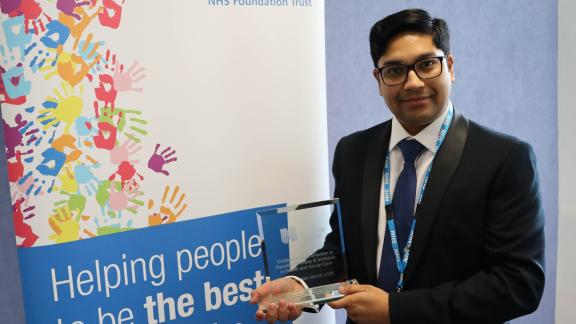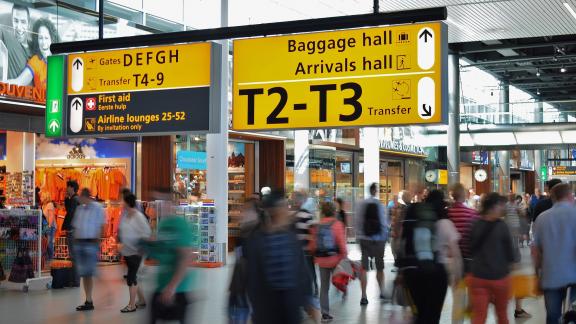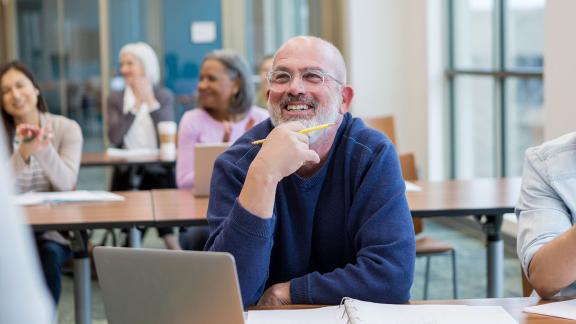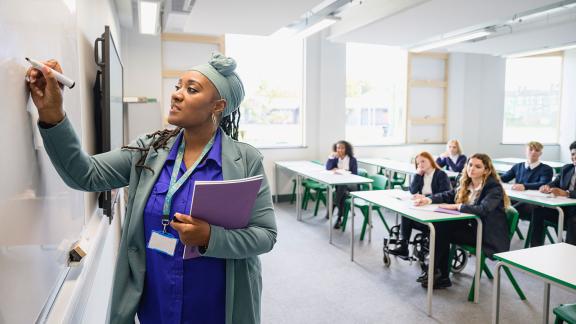Journey of an international AHP: student to director

In this blog Deepak Agnihotri shares thoughts on his career journey in the NHS as an overseas worker, from starting out as an international student to becoming a training programme director at Health Education England (HEE) North West and allied health professions BAME strategic advisor at NHS England. He looks at how organisations can improve the experience of future overseas workers joining the NHS and offers insight and advice to employers on how to potentially improve recruitment processes.
I am a registered allied health professional (AHP) and the first advanced clinical practitioner (ACP) physiotherapist in the UK to become an independent prescriber, helping people with dementia and learning disabilities.
It’s been a fascinating and complicated journey, starting as an international student to becoming an ACP. I was born in India, where I did my undergraduate degree for physiotherapy. One of the things that really made me realise the potential of physiotherapy was a placement in an old age facility - I saw how rewarding it was and the difference I was making for patients.
After qualifying, I worked in Mumbai, and then came to the UK to do my postgraduate qualification in gait analysis and manual therapy at the University of Salford. Even after doing an MSc and publishing research, I found securing a full-time job very difficult. I submitted hundreds of job applications before finally getting my first job at St Helens and Knowsley Teaching Hospitals NHS Trust.
I feel that one of the major barriers for me was the expectation of NHS experience by employers: that’s one of the things that’s always a challenge for international AHPs as they may lack knowledge of health and social care systems in the UK. To remove this barrier, employing organisations could move away from knowledge-based recruitment to values-based recruitment.
I was very fortunate to have a clinical placement in the NHS supported by my personal tutor and head of school, but despite being a qualified physiotherapist, I didn’t have the information about the NHS and how it functions. That is the biggest issue that international students and recruits face. Trusts could resolve this by using their websites to provide this information. If you are an inclusive employer then you will have information relevant to all professions, professional backgrounds, and the cultural backgrounds on your website. Providing explanations as to what terms such as flexible working mean can be helpful, because for people not in the UK, these can be alien terms.
One of the things that struck me was that in the UK, when you move into a field, you stay in that speciality. If you work in, for example, a neurology department and want to transfer to a musculoskeletal department, it isn’t possible. I moved into learning disability by chance as I got a Band 6 job through covering a maternity leave post. I realised that I could use all my skills in this department: I could see a falls patient, a fracture patient, or somebody with cerebral palsy, for instance. However, most physiotherapists in the UK don’t see such a wide range of patients. I think it would help if employing managers had an increased awareness of the courses that international AHPs have done and the skills and experience they have. If training could be provided for managers on these things, I think that they would see international AHPs differently.
Getting used to living in the UK was the biggest learning curve. I missed my home and my family. There are lots of things that employing organisations can do to make this easier. Firstly, every recruit should have a copy of the timeline and process of recruitment and employers should ensure that they have a single point of contact for every international recruit. This person should try to respond to emails in a timely way to help to build rapport and lessen the anxiety felt by the international AHP. My second suggestion would be that employers need to think about appropriate and dedicated pastoral support including going to the airport and receiving the international recruit when they arrive in the UK, because that makes a difference.
There is an international recruitment toolkit and checklist that employing organisations can use to check how good they are at supporting international AHPs: it includes details about the work that needs to be done pre-arrival, at arrival and post-arrival. This information is already available on the NHS Employers website but all employers should do these checks so they can assess their support.
Employers needs to think about appropriate support for AHPs including professional, social, and cultural aspects to help with integration and improving the sense of belonging in the NHS. Employers need to work with people already working in the organisation who can help with this, such as BAME networks, and regional and local overseas community networks. Employers should use a buddy system and try to put employees from the same home country in contact with each other, even if they are not working in the same profession.
Another very important thing that managers need to consider is the cut-off dates for pay. A person living in another country may not know about these cut-off points, and if they begin work just after this date in an organisation, it can lead to them having almost two months, in some instances, in a new country without a wage. Employers should also consider allowing employees to work flexibly; many will have used public transport which can be late at times. Professionally, managers should provide appropriate supervision for international AHPs, at least fortnightly, to help them manage their clinical case load, as well as to help them understand the language and the NHS as a system. Once employers do these things, they will make a massive difference to the international recruit, and they will be a valuable asset to the organisation.
For further information please contact: deepak.agnihotri@hee.nhs.uk



